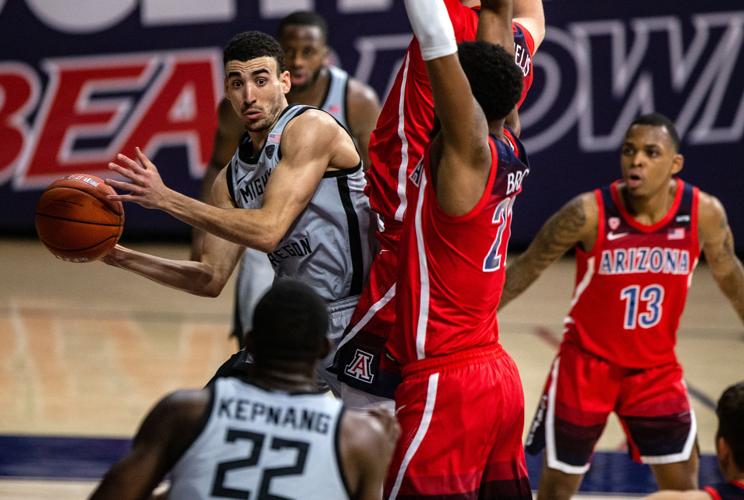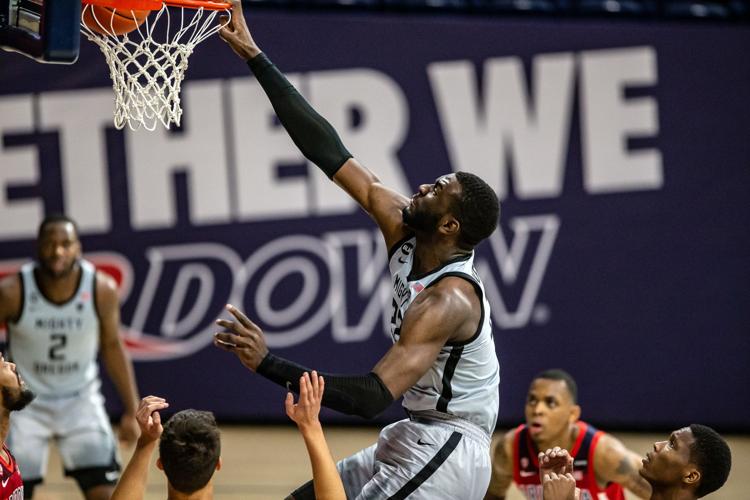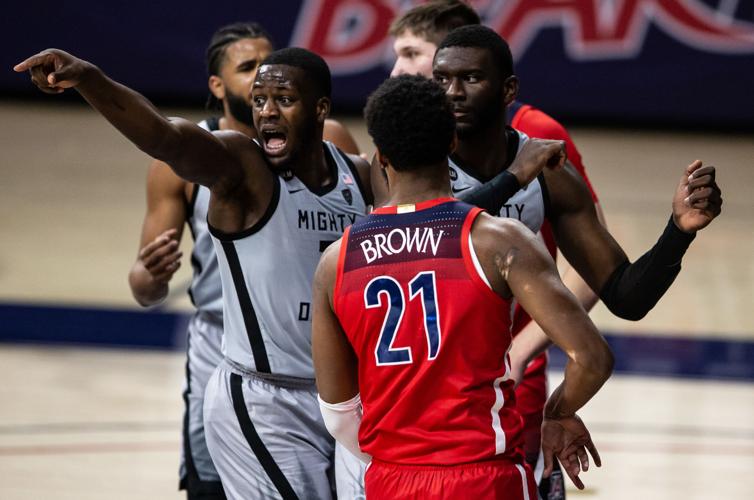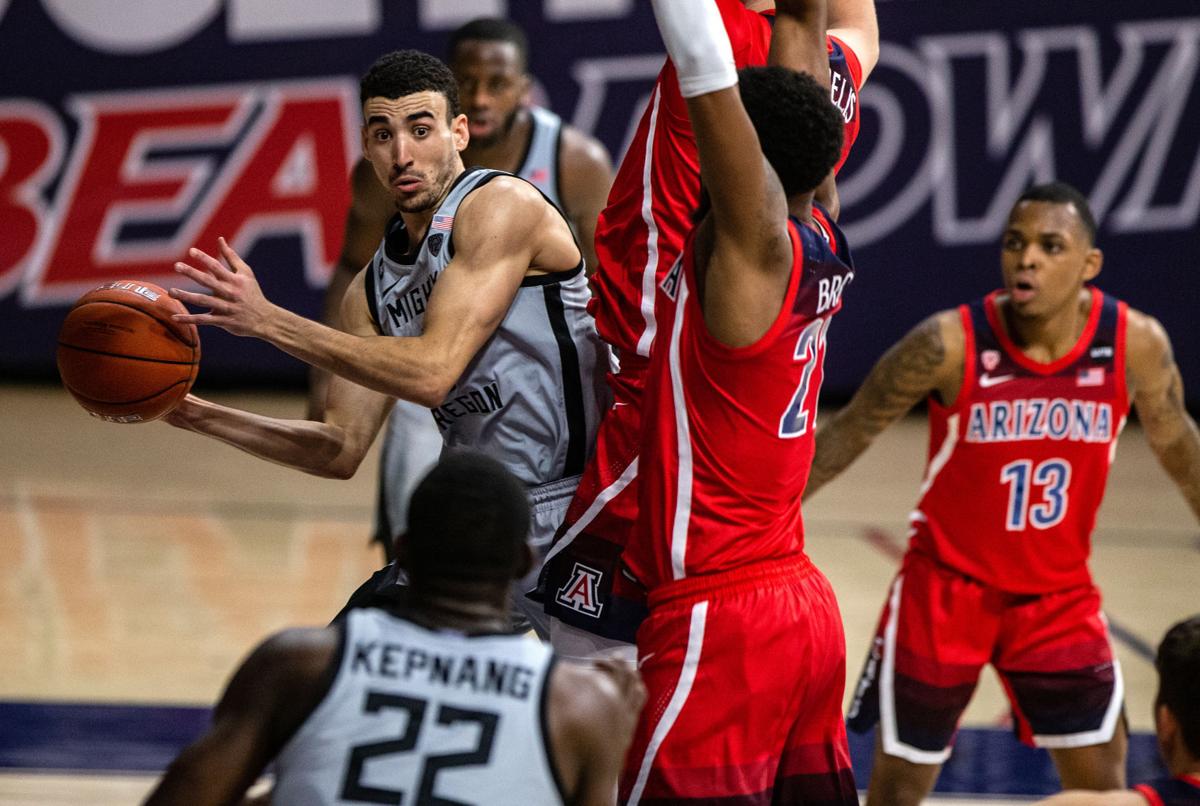In a season when everything has been memorably different, one thing didn’t change a bit Saturday at McKale Center.
Yep, Oregon beat Arizona, barely, somehow, again. There were no fans and no live sound, not even parents, while ESPN’s Bill Walton and Dave Pasch only made a virtual appearance to describe the latest chapter in what has arguably been the Pac-12’s liveliest rivalry over the past decade.
In Oregon’s 63-61 win this time, it wasn’t now-departed Payton Pritchard playing hero for the Ducks. Instead, Chris Duarte broke free to hit an open 3-pointer during an otherwise well-defended possession with 17 seconds left, while the Wildcats failed to get off an uncontested shot the rest of the way.
As Arizona coach Sean Miller also indicated with obvious displeasure, it didn’t have to end this way. The Wildcats had put themselves in such a perilous spot in part by getting outrebounded for the first time all season, 38-30, with Oregon scoring 16 second-chance points on 12 offensive rebounds.

Oregon center Franck Kepnang dunks during Saturday’s game. Kepnang scored seven points on 3-for-3 shooting in 17 minutes.
In addition, the Wildcats shot just 38.6% while finding their way to the line just 11 times despite entering the game as the nation’s leader in attempted and made free throws.
Those issues resulted in Arizona (14-7 overall and 8-7 in the Pac-12) losing to Oregon (12-4, 7-3) for the sixth straight time, with three of those games decided in overtime and the last three games having been decided by a total of four points.
“There’s no excuse. You’ve got to win close games,” Miller said. “Every losing team has their stories, that you lose this one by one point, you lose that one by two points. There’s a reason you lose: Because you’re getting your ass kicked.”
Aside from all the rebounds they didn’t pull down, Arizona only managed a two-point advantage from the free-throw line, making 8 of 11 while Oregon made 6 of 11, after they scored 17 more points at the line than Oregon State in a 70-61 win on Thursday.
Still, after Oregon’s L.J. Figueroa hit a 3-pointer to give Oregon a 60-59 lead entering the final minute of the game, Arizona’s Christian Koloko drew a foul from Eugene Omoruyi along the baseline and went to the line for a pair of critical free throws with 34 seconds left.

Arizona’s Bennedict Mathurin sends in a dunk during Saturday’s game. The freshman struggled from the field, hitting 2 of 10 shots.
Koloko, who had missed two potential game-winning free throws with 1.4 seconds left in overtime of Oregon’s 73-72 win at McKale Center last season, this time hit both ensuing free throws to put the Wildcats ahead by one.
Then Oregon’s Will Richardson drove inside and out to the right corner, but he and Duarte initially passed it back and forth, unable to find an open look before Richardson passed back from near the right corner to Duarte on the right wing for what turned out to be the game winner.
For Oregon coach Dana Altman it was reminiscent of the Ducks’ win at McKale Center last season, when Arizona couldn’t come down with a rebound in a crowd after Pritchard missed a 3-pointer — with Oregon’s Shakur Juiston reaching past Koloko to tap the ball out to the right corner, where Richardson picked it up.
Richardson then drove inside and to the left of the hoop, passing it under the basket to Juiston, who made what turned out to the game-winning bucket when Koloko missed his free throws.
This time, Richardson flipped it to Duarte instead.
“He made a great decision and got it to Chris — and Chris hit the dagger,” Altman said. “It is very good. Last year, we knew we were going to Payton and in the overtime we went to another senior, Shakur, and Will did make a heck of a play.”
Richardson’s play on Saturday also showed faith in Duarte, who had shot just 3 for 13 overall and made only 1 of 6 3-pointers before hitting the game-winner. Duarte said the Wildcats had been following him closely every time he cut off a screen, making it difficult to find his rhythm.
“I had to thank my teammates for telling me to keep my head up,” Duarte said. “And thanks to Will on that pass. It’s all about my teammates, man. We played hard and we played together.”

Oregon forward Eugene Omoruyi reacts to a call by a referee during Saturday’s game. He finished with a team-high 19 points.
Arizona still had 15 seconds to tie or win the game but couldn’t get off a shot before Duarte fouled Bennedict Mathurin on the perimeter. Because Mathurin wasn’t shooting and Arizona was not in a bonus situation, that set up an inbounds play with 1.1 seconds left.
Terrell Brown then inbounded to Kerr Kriisa, who looked for Azuolas Tubelis but ultimately threw up a defended 3 at the buzzer that didn’t fall in.
Kriisa said he went into the play thinking if Tubelis couldn’t get open inside off a screen, he would pop open for a 3. But, as it turned out, neither of them were really open.
“We were really hoping to get Azuolas open over the top but with 1.1 seconds left, you’re really limited, and to have him jumping off his right leg as a left-handed player …” Miller said.
“That was kind of the first look. Kerr is our best screener. He just has a good feel for the screen. We kind of fake cut and he screened in. He did a good job — he popped out, caught it and I believe he got a shot to win it but unfortunately missed it.”
Miller then immediately qualified that statement.
“It was contested. You know, the problem with Chris Duarte’s shot in front of their bench (was that) it wasn’t contested. He was wide open. And when you’re in the final minutes of games, you can always live with a final contested shot. But it’s kind of a head-scratching moment when, even though they ball-fake and move, you want to contest that.
“If he makes a contested shot, which he probably would have, that’s fine. But you can’t be wide open.”
Not in a game like this. Arizona had actually battled back from a 10-point deficit midway through the first half to tie the game at 34 entering halftime, but the entire second half was played with no more than one possession separating the teams.
Of course it was that way. It was Arizona against Oregon, after all.
“I wish I could do a better job,” Miller said. “Obviously, six in a row, you’d like to get one. But that’s just what happens when you lose.”








